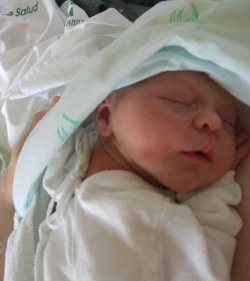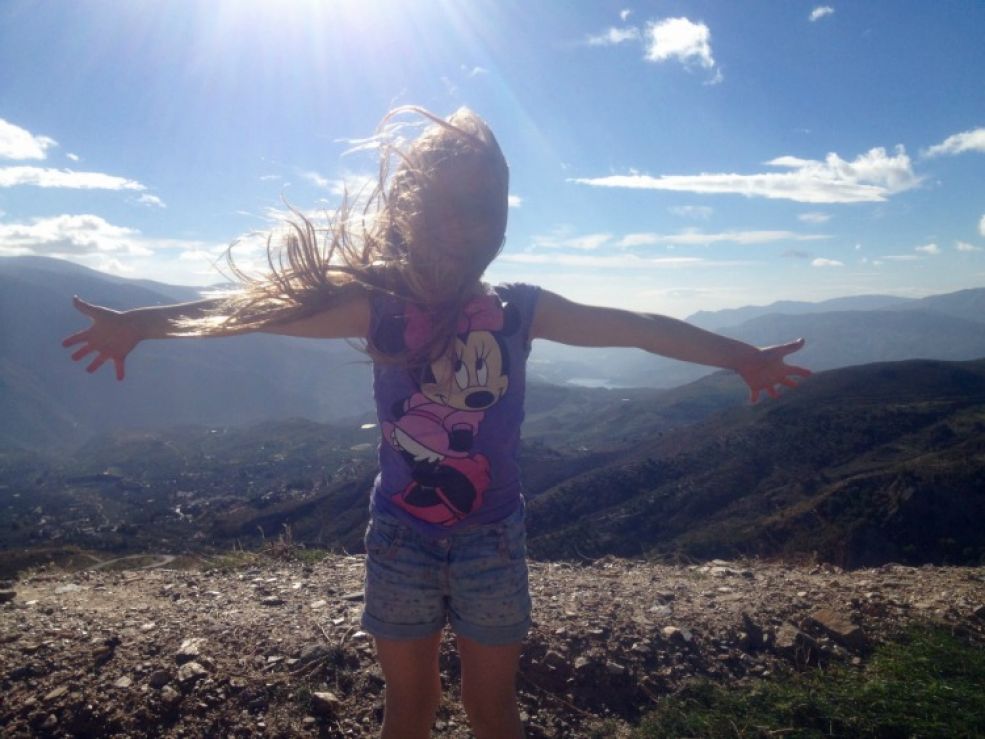
Very little Bibsey
I have been trying to write this post since I started the Bibsey Blog a couple of months ago. I wanted to write something responsible and helpful, but every time I return to it, it seems to me that what I have written is perhaps too negative. So, I think that this post requires a disclaimer:
The following is based on my experience of giving birth and the experiences of some other women I know who have given birth here in Spain. Although of course I have heard positive stories, the internet is also littered with stories of unpleasant birth experiences here. I know that when I was pregnant, I chose not to read them and tried not to listen to too many negative birth stories. It was my first (therefore, I have nothing to compare it with) and I wanted a natural birth. I wanted to be calm and positive and to give my body and my beautiful baby the best chance to do what I thought should come naturally.
However:
1. The medical staff on duty at the hospital were apparently not interested in my birth plan – written in Spanish and English. While I was still remotely in charge of myself I should have insisted on talking it through with the midwife. I feel a little foolish now thinking back to some of the hopes and requests that I put down in the plan. Not because they were naive or unrealistic (there was nothing in there that I hadn’t been led to believe was possible in my antenatal classes), but because it all went out of the window so fast.
2. The procedures were incredibly invasive from the start. I was handling my contractions well until they gave me my first internal examination. This went on forever and involved stirrups and a lot of poking by various people who were not introduced to me. It was stressful, frightening and painful and I was on my own – Mr B had been banned (see point 5). It was while I was in this position that I started to find that I couldn’t cope with the contractions. It was also in this position and during a contraction that a doctor asked me if I would be wanting an epidural. I asked if we could wait to discuss it – meaning after the contraction – and that was the last I saw of him until many many many long hours later.
Despite requesting in my birth plan that I should be allowed to move around during labour, the staff more-or-less insisted that I be on my back so that they could monitor the baby – this was in the early stages when there really was no medical justification. The baby’s heartbeat was fine, but it seems to me that they used scare tactics to keep me immobile on the obstetric bed.
Finally on this point, of the very small sample of women who I have spoken to here in Spain, a surprising number of their babies were delivered by ventouse. The woman in the bed next to me also had a ventouse delivery. This is not comprehensive, rigorous research but I think that it is quite telling. It seems to me that they are little bit suction-cup-happy here.
3. Avoid la sala de dilatación if at all possible by not turning up at the hospital too early (easier said than done the first time around, especially if you live out of the city and have a long drive to the hospital). This is the place where you are put if you are not yet dilated enough to go to the birthing suite, and you could be sharing a room with four other women. These women will probably have their whole families in there to keep them company, despite notices up in all the corridors and rooms stating that there is a limit of two visitors per bed.
I was in with a woman whose waters had broken but whose contractions had not yet started. Her whole family was there watching the football in the room while I was dealing with contractions. I just wanted them to f*** off.
4. You are only allowed one person with you for the birth. I had considered employing a doula to be with me for the labour. It would have been great to have someone on my side who was fluent in Spanish, had a knowledge of the whole process, and who was not emotionally involved. But of course having Mr B there was more important. I couldn’t have both. I had to choose.
In the event it was surprising how much Spanish I could muster when under pressure. And I did realise and accept that the onus was on me to try. I chose to live here and have my baby here and I love the challenge and having the opportunity to learn Spanish. It is also worth noting that most doctors in Spanish hospitals that I have met speak good English.
5. Try to insist on having your partner with you at all times – if that is what you want of course. Mr B and I got separated three times. On arrival I was taken off for prodding and poking (they had my legs in stirrups before you could say ‘where have my knickers gone?’) and after an hour he had to push his way in to find me. When I was taken from la sala de dilatación to the birthing room he was in the loo and they refused to wait for him. Again he had to come and find me and push his way into the maternity ward. And finally, he was banished when Little B was delivered by ventouse – this is pretty standard I think, like when you have an emergency C-section.
I have read other stories online about women giving birth in Spain when couples have been separated on arrival and then the fathers have not been allowed in until after the birth. Can you imagine?
6. The staff on duty appeared hell-bent on delivering getting my baby out by the end of the shift. All night we heard ¡Venga Venga Venga! and ¡No puedo no puedo no puedo!… followed by the sound of crying babies. About 12 hours in I had an epidural after which I was pretty much left to my own devices. First the pain continued unabated and then after a top up I felt nothing. They told me I was 8 1/2 cm dilated and to push when I had a contraction and then left the room. I had not a clue what they were talking about. Push? How? Was I even having contractions anymore? I was of course, but the only indication of this was the graph on the monitor. I was too terrified, tired and confused (mentally and bodily) to try when there was no-one there to ‘catch’ the baby. Surely not Mr B’s job.
7. Shockingly (for me) they do this thing where someone ‘jumps’ on your tummy with their forearm during the ‘final push’. At that moment in time my legs were tied to the bed, I was having my baby dragged/sucked out of me, having my episiotomy snip (not discussed), there were at least 10 people in the room (I really am not kidding) and I thought that this woman was going to hold my hand or give me encouragement. Instead she heaved her weight onto my ribs, which felt bruised afterwards. Any midwives out there – what is all that about? They gave no warning and no explanation. There was no mention of this in the antenatal class.
8. And after the birth you will probably share a room with at least one other woman and all her family will be there when you are recovering. Be prepared to be breastfeeding (possibly for the first time) in front of a small helpful audience. The lady in my room was lovely and she helped me communicate with some of the nurses when I was just too tired to understand or speak any Spanish.

Don’t you mess up my nice clean sheets now
9. Get the nurses on side. They can be a little brusque and insensitive at first but with smiles and little effort they thaw (I have another experience of the same hospital and I was impressed – but that is another post). Of course it helps if you can speak Spanish or at least if you try – which I did. I had a complete harridan (think nurse Ratched from One Flew Over the Cuckoo’s Nest) who dragged me off by the arm to the loo in front of all the ‘visitors’ berating me for not having put any knickers on (they were in my suitcase under the bed) and not having changed my sanitary pad. This was the first time my feet had touched the floor since the epidural.
10. On a positive note, in my experience the food is good in Spanish hospitals. Take advantage of this and eat as much of it as you can before leaving the hospital, even if your partner or someone else is on hand to cook at home. We found meals incredibly hard to pull together in the first few days and I felt like some kind of feral animal wolfing food down in the few moments that I could grab between doing whatever it is I was doing with Bibsey. It’s all a blur now.
OK. So, looking back, I was unprepared. I was sad for a long time after the birth. Not depressed, but sad everytime I thought about the birth. I didn’t feel that I had done my best. I felt that I had been weak and useless.
When Bibsey finally arrived they checked her over and I was allowed to hold her after a couple of minutes before they whisked her away (she was gasping a little for air). We don’t really know what she went through during that short time we weren’t with her. Friends had told me to consider each dreadful contraction as being one step closer to meeting your baby. I was sad looking back because by the time she arrived, I had completely lost sight of the end goal: holding my baby. I almost didn’t know what I was doing there anymore. Her arrival was traumatic for her, for me and Mr B – and let’s not forget or underestimate how scary this whole experience is for the fathers.
Enough! I could of course go on and on. I only that hope that this may help someone prepare for the labour ward in Spain, or anywhere else for that matter, and that they will have the best birthing experience possible. I know that the staff at the hospital where Little B was born did everything they did in order to protect her and I am grateful that she was finally delivered safe and sound. Here the emphasis is very much on the safety of the child, and rightly so. As a result they have a good infant mortality rate, better than the UK for example. However, I do think a little more care could be given to the wishes of the mothers and fathers.
I have a Spanish friend whose baby is due very soon. She is planning a home birth and I admire her for making that choice. I actually believe, although I can never be sure, that I would have had a more straightforward and less traumatic experience if I had done something similar. I think that it was the stress and fear caused by the proddery pokery in the hospital that caused my labour to slow down leading to the final intervention with the ventouse.
I also believe, knowing what I know now, that next time (should there be one) I can still hope for a natural birth and an experience that I can look back on without feeling sad and disappointed.
There are many birth stories out there and I was finally spurred on to finish this post by a moving article in Real Parenting written by ghostwritermummy. I would be really interested to hear from other women who have had a similar experience especially with a ventouse delivery. For that matter, I would love to hear from women who have had very different experiences here in Spain. Perhaps, all being well and with the permission of my Spanish friend, I will soon have a more positive story to tell of childbirth in Spain.
***
Linked up with Actually Mummy’s Share Your Birth Story Linky on 17 Nov 2011








